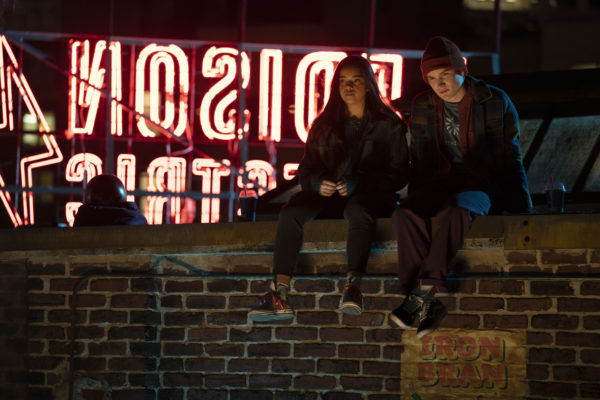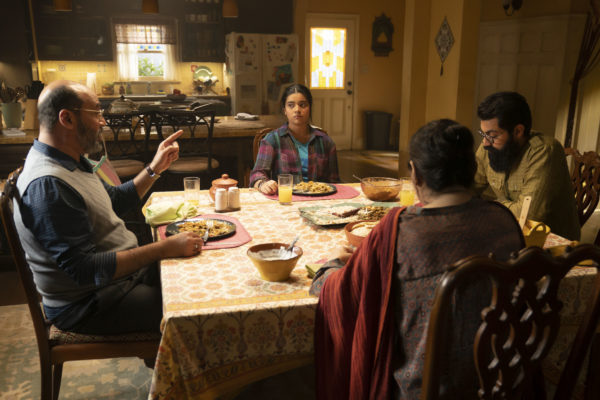
The latest Disney+/Marvel collaboration focuses on a Pakistani teen obsessed with the Avengers…who becomes one.
The most recent batch of Disney+ Marvel shows have been a bit hit and miss, particularly when it comes to prioritizing spectacle over character development. Considering the YA roots of the comic property, it’s something of a relief to report that Ms. Marvel and Kamala Khan (played by newcomer Iman Vellani) is firmly rooted in family, community and coming of age.
This eight episode season of Ms. Marvel (I’ve seen the first two) is designed, like many of the forthcoming series, to generate audience interest in a character who will eventually appear in big screen Marvel movies (in this case, 2023’s The Marvels). It’s a smart ploy that Kevin Feige and co. have used before, principally in the build-up to the first Avengers, and it feels particularly appropriate for this character, considering her reverence for all things Avengers.
The absolute best part of Ms. Marvel is Vellani. Even when the series is focused on some pretty standard coming of age tropes (the rebellious nature of youth, paired with a cultural disconnect between immigrant parents and their American-born children), Vellani brings likeability and charisma to the project. It’s a star-making turn and vital to the series because the actress must perfectly balance the struggle of conforming to cultural norms while maintaining a deep respect for her community (without it feeling cloying).
That community is principally reflected in Kamala’s relationship with her parents, mother Muneeba (Zenobia Shroff) and father Yusuf (Mohan Kapur). For audiences with even a passing awareness of YA conventions, there’s not much new in their dynamic: Muneeba is strict and disapproving, Yusuf defers to his wife while quietly championing his daughter. There are, however, hints that the series will further complicate and explore the family dynamic, which includes Kamala’s brother Aamir (Saagar Shaikh), who is provided more leeway by the parents because he is older, male, and already married to Tyesha (Travina Springer).

Kamala has a pair of close allies that encourage and support her. The most important is Matt Lintz‘s Bruno, with whom Vellani has great chemistry. Kamala’s bestie gives off a strong Peter Parker/junior Tony Stark vibe with his technological prowess and “boy next door” good looks. Like most of the other components of the show, Kamala and Bruno’s relationship is extremely familiar: he’s madly in love with her and she completely fails to see it, which becomes a source of gentle conflict when hot, rich new guy Kamran (Rish Shah) arrives in episode two.
The other key player is Kamala’s best friend Nakia Bahadir (Yasmeen Fletcher), who offers an alternative depiction of a Muslim teen. In the first two episodes, Nakia’s storylines primarily involve her faith and her feminism; Ms. Marvel uses the character to educate audiences on the reasons for wearing a hijab (Nakia does; Kamala doesn’t) and the gendered politics of attending mosque (there are separate entrances, and less funding and security for women). These storylines complement the push and pull between Kamala and her family while also providing a surprising amount of humour, such as when Nakia emotionally blackmails Yusuf to support her political bid in the mosque elections by appealing to his desire to support young women.

What may discourage the young, male audience that typically flocks to Marvel properties is the fact that Ms. Marvel is less action-oriented that its Disney+ predecessors. Both of the first two episodes feature at least one major action sequence, though the stakes are more specific and contained compared to the usual “lives in jeopardy” we’ve seen in other Marvel properties.
In the premiere, Kamala and Bruno sneak out to Avenger Con where Kamala hopes to seize the Captain Marvel cosplay crown. Instead she winds up causing massive destruction when the family heirloom she fashions as part of her costume inadvertently activates her latent powers.
In episode two, Kamala must use the powers she hasn’t entirely mastered to rescue a boy who falls off a building during a busy Eid celebration. This sequence is not only more exciting because it pays off the training montage from earlier in the episode, but also because the action is directly aligned to the series’ central conflict, namely how Kamala balances her youthful obsession with the Avengers with her responsibility to her parents and her community.
There are several other characters in the mix, including a former best friend-turned-rival, Zoe (Laurel Marsden), as well agents from the Department of Damage Control (DODC). P. Cleary (Arian Moayed) and Sadie (Alysia Reiner) are introduced in the first episode’s post-credits scene and become much more antagonistic in episode two as they zero in on the mysterious superhero whom they believe attacked Avengers Con. There’s also a mystery woman who calls to Kamala, which is rooted in the family’s traumatic history with the Partition of India. One hopes that this rich and important storyline will continue to be explored, and in greater depth, over the rest of the series.
Overall, Ms. Marvel is lighthearted and full of joy. Kamala is fun, occasionally flighty and always determined. Her free spiritedness is evoked in head writer Bisha K. Ali‘s dialogue, as well as the visual and audio iconography of the show, which uses pops of colour, graffiti and Indian music to create a vibrant, fleshed out world. In one stand-out sequence, Kamala dances through the house to her own soundtrack, lost in the idea of dating Kamran to the amazement and concern of her family.
It’s a perfect distillation of what the show is all about: fun, family and yes…just a touch of “with great power, comes great responsibility.”
Ms. Marvel airs Wednesdays on Disney+